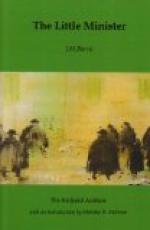“Tell him,” Dow roared; “and tell him what I said too. Ay, and tell him I was at the Kaims yestreen. Tell him I’m hunting high and low for an Egyptian woman.”
He flung recklessly out of the courtyard, leaving Jean looking blankly at the mud that had been holly lately. Not his act of sacrilege was distressing her, but his news. Were these berries a love token? Had God let Rob Dow say they were a gypsy’s love token, and not slain him?
That Rob spoke of the Egyptian of the riots Jean never doubted. It was known that the minister had met this woman in Nanny Webster’s house, but was it not also known that he had given her such a talking-to as she could never come above? Many could repeat the words in which he had announced to Nanny that his wealthy friends in Glasgow were to give her all she needed. They could also tell how majestic he looked when he turned the Egyptian out of the house. In short, Nanny having kept her promise of secrecy, the people had been forced to construct the scene in the mud house for themselves, and it was only their story that was known to Jean.
She decided that, so far as the gypsy was concerned, Rob had talked trash. He had seen the holly in the minister’s hand, and, being in drink, had mixed it up with the gossip about the Egyptian. But that Gavin had preserved the holly because of the donor was as obvious to Jean as that the vase in her hand was empty. Who could she be? No doubt all the single ladies in Thrums were in love with him, but that, Jean was sure, had not helped them a step forward.
To think was to Jean a waste of time. Discovering that she had been thinking, she was dismayed. There were the wet clothes in the basket looking reproachfully at her. She hastened back to Gavin’s room with the vase, but it too had eyes, and they said, “When the minister misses his holly he will question you.” Now Gavin had already smiled several times to Jean, and once he had marked passages for her in her “Pilgrim’s Progress,” with the result that she prized the marks more even than the passages. To lose his good opinion was terrible to her. In her perplexity she decided to consult wise Tammas Haggart, and hence her appeal to Margaret.
To avoid Chirsty, the humourist’s wife, Jean sought Haggart at his workshop window, which was so small that an old book sufficed for its shutter. Haggart, whom she could see distinctly at his loom, soon guessed from her knocks and signs (for he was strangely quick in the uptake) that she wanted him to open the window.
“I want to speak to you confidentially,” Jean said in a low voice. “If you saw a grand man gey fond o’ a flower, what would you think?”
“I would think, Jean,” Haggart answered, reflectively, “that he had gien siller for’t; ay, I would wonder—”
“What would you wonder?”
“I would wonder how muckle he paid.”
“But if he was a—a minister, and keepit the flower—say it was a common rose—fond-like on his chimley, what would you think?”




